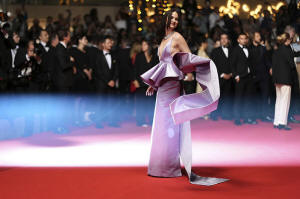|
On
Saturday, Neon could make it six in a row, adding to its Palmes
for “Parasite,” “Titane,” “Triangle of Sadness,” “Anatomy of a
Fall" and “Anora.” As far-fetched as that might sound, it might
even be likely.
Four of the most widely acclaimed film of the festival — Joachim
Trier’s family drama “Sentimental Value," Jafar Panahi’s revenge
thriller “It Was Just an Accident,” Kleber Mendonça Filho’s
political thriller “The Secret Agent” and Óliver Laxe’s desert
road trip “Sirât” — will be distributed in the U.S. by Neon.
No one knows which way the nine-member jury headed by Juliette
Binoche might vote. Their deliberations are done privately, and
there are several other films seen as contenders. But critical
reception is often a decent guide to what's in the mix at
Cannes.
Other films will strong support include Ukrainian filmmaker
Sergei Logznitsa’s period drama “Two Prosecutors”; Richard
Linklater’s New Wave ode “Nouvelle Vague”; and Spanish filmmaker
Carla Simón’s personal coastal tale “Romeria."
Saturday's ceremony brings to a close a 78th Cannes Film
Festival where geopolitics cast a long shadow, both on screen
and off. Shortly before the French Riviera extravaganza, which
is also the world's largest movie market, U.S. President Donald
Trump floated the idea of a 100% tariff on movies made overseas.
Most filmmakers responded with a shrug, calling the plan
illogical. “Can you hold up the movie in customs? It doesn’t
ship that way,” said Wes Anderson, who premiered his latest,
“The Phoenician Scheme” at the festival.
That was one of the top American films in Cannes, along with
Spike Lee's “Highest 2 Lowest,” the Christopher McQuarrie-Tom
Cruise actioner “Mission: Impossible — Final Reckoning” and Ari
Aster's “Eddington.”
All contents © copyright 2025 Associated Press. All rights reserved

|
|




